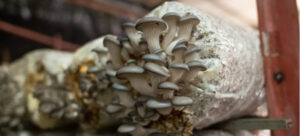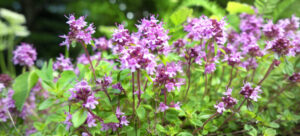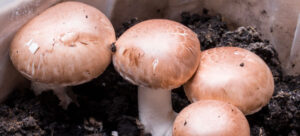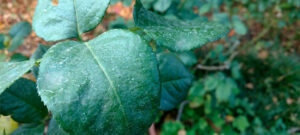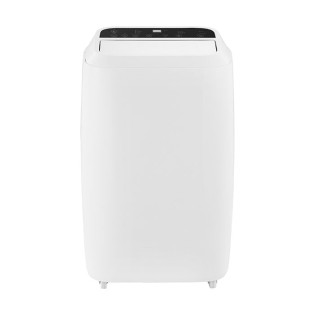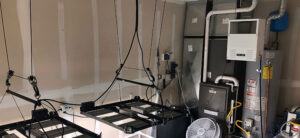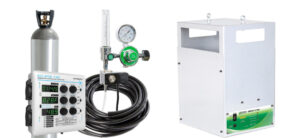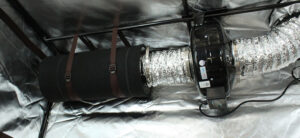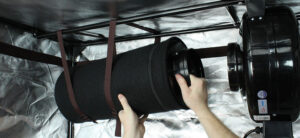
Are you, your family, and your indoor plants or garden protected from all of the pollution created by wildfire smoke?
Don't wait to find out that you are not prepared for wildfire season. It seems now more than ever the fire season never ends. In 2023 we are seeing massive wildfires in Canada affecting most of the eastern United States. This is causing many people, animals, and plants to suffer. Luckily there are steps you can take to help protect yourself and your plants.
Is fire smoke bad for plants?
Yes, fire smoke can be harmful to plants, especially when it comes to long or heavy exposure. Here are some reasons why fire smoke can be harmful:
- Toxic Compounds: Smoke from fires often contains toxic compounds, including polycyclic aromatic hydrocarbons (PAHs) and volatile organic compounds (VOCs). These substances can be harmful to plants, leading to leaf burn, reduced growth, and even death. This can be especially true for sensitive plant species.
- Reduced Air Quality: Fire smoke can greatly affect air quality by increasing pollutant levels. High concentrations of pollutants can weaken plants and make them more likely to get diseases, pests, and stress. Additionally, high levels of ozone, a pollutant commonly associated with fire smoke, can damage plant tissues and have an impact on important plant functions.
- Long-Term Effects: Some plants may recover from short-term exposure to fire smoke once the air quality improves. Long or repeated exposure can have more harmful and long-lasting effects. Repeated exposure to smoke can weaken plants, reduce their vigor, and make them more like to get a disease and other stressors.
If your plants have been exposed to fire smoke, monitoring their health closely is recommended. You will need to provide good care to support their recovery. If you have concerns about the specific conditions in your garden or agricultural area, consult with local plant experts. Agricultural services can provide you with more specific advice.
Will wildfire smoke hurt my garden?
Wildfire smoke can potentially have bad effects on your garden. It will depend on various factors such as the duration and intensity of the wildfire smoke. Also, the sensitivity of your plants, and the specific composition of the smoke.
Do plants absorb wildfire smoke?
Plants can absorb certain pieces of wildfire smoke. The extent of absorption and its effects vary depending on the specific plant species and the makeup of the smoke.
During and after a wildfire event, it's crucial to monitor the health of your plants. You will need to provide care and take necessary measures to lower the effect of smoke exposure.
Is wildfire ash good for plants?
Wildfire ash can have both positive and negative effects on plants. It depends on various factors such as the composition of the ash, the type of plants, and the amount deposited. Here are some thoughts:
- Nutrient Source: Wildfire ash can be a source of important nutrients for plants. Ash contains varying amounts of nutrients like potassium (K), calcium (Ca), magnesium (Mg), and trace elements. When ash is mixed into the soil, it can provide these nutrients, potentially benefiting plant growth.
- Alkaline pH: Ash from wildfires is often alkaline in nature, which means it has a high pH. Some plants prefer acidic soil conditions, so the alkaline nature of the ash may not be suitable for them. However, certain plants, like those that are used to dry or alkaline environments, may tolerate or even thrive in alkaline soils.
- Soil Structure: Ash can alter soil structure by affecting its texture and water-holding capacity. Fine ash particles can compact the soil and reduce its permeability, potentially hurting water and air movement. This compaction may adversely affect plant root growth and nutrient uptake.
- Toxicity and Contaminants: While ash can be a source of nutrients, it can also contain toxic substances. This is especially true if the burned materials include treated wood, plastics, or other human-made materials. These toxins can be harmful to plants and may stay in the area.
Overview of Smokes Impact on Plants and Humans
Smokes Impact on Plants:
Reduced Photosynthesis: Smoke can block or reduce sunlight, leading to decreased photosynthesis. Photosynthesis is important for plant growth and energy production.
Particulate Matter: Wildfire smoke contains particulate matter, including ash and soot, which can settle on plants and affect their health. Heavy amounts of ash can hurt the plant's ability to gather light and may block sunlight. Soot can clog leaf stomata, stopping gas exchange and affecting plant breathing.
Leaf Damage: Smoke particles can settle on plant leaves, blocking their stomata (pores). This greatly lowers the exchange of gases and worsens respiration and transpiration processes.
Disruption of Plant Physiology: The chemicals present in smoke, such as sulfur dioxide and ozone, can damage plant tissues. They also interfere with their metabolic processes and disrupt overall plant physiology.
Stunted Growth and Reduced Yield: Smoke exposure can result in stunted growth, reduced plant productivity, and diminished crop yields.
It's important to note that the severity of the impact may depend on the concentration and duration of smoke exposure. The specific characteristics of the smoke can also have an effect (e.g., chemical composition, particulate size). Protecting yourself from smoke and minimizing smoke exposure for plants is crucial to avoid health risks and damage to plants.
While the extent of damage depends on the factors mentioned above, it's important to note that many plants can recover. Most plants are able to recover from short-term exposure to wildfire smoke once the air quality improves. However, prolonged exposure or repeated smoke events can have more severe and long-lasting effects.
Smoke Health Effects on Humans:
Respiratory Issues: Smoke contains various toxic chemicals, such as carbon monoxide, volatile organic compounds (VOCs), and particulate matter (PM). Inhaling smoke can lead to several different respiratory problems. This includes coughing, wheezing, shortness of breath, asthma, or other breathing conditions.
Cardiovascular Problems: Fine particles present in smoke can penetrate deep into the lungs and enter the bloodstream. This can increase the risk of heart attacks, strokes, and other cardiovascular issues.
Irritation and Inflammation: Smoke can cause inflammation of the eyes, nose, and throat, leading to discomfort, and coughing.
Increased Susceptibility to Infections: Smoke weakens the immune system, making individuals more like to get respiratory infections like bronchitis or pneumonia.
Who is at risk? Things sensitive to wildfire smoke or excess pollution include:
- Plants & Crops
- Children younger than 18
- Adults 65 or older
- Pregnant women
- People with chronic health conditions such as heart or lung disease, asthma, or diabetes
- Anyone who is seriously ill
- Outdoor workers
- People who live in or near forested areas where wildfires occur.
- Animals & Pets
Use Air Purifiers To Help Combat Excess Pollution From Wildfires
Not all air purifiers do a good job of removing wildfire smoke. The most effective air purifiers for smoke have a HEPA filter and a fan. This helps to aid to force air through a fine mesh to trap particles.
The best air purifiers fitted with HEPA filters can reduce particle concentrations by as much as 85 percent. If you want to get rid of the smell of smoke in addition to particles, you’ll want a carbon filter. A carbon filter helps to absorb odors.
Enviroklenz UV Mobile Air System
The Enviroklenz Mobile Air System With UV is a compact movable air system that combines particulate removal and odor control into a powerful tool for controlling a variety of air quality concerns.
The first stage of filtration focuses on the chemicals via the patented Enviroklenz Cartridge, while the second stage works against small particulates down to .3 microns in size using HEPA filtration. This stage of filtration is what cleans the air of wildfire smoke.
UVC light is then used to expose HEPA filtration-captured particulates to the germicidal range of ultraviolet light. Easy to set up and install, the system has simple maintenance and can be left on between filter changes.

FILTR Revolution Air Purifier

The FILTR Revolution Air Filtration System was engineered to combat all forms of air pollution, from mold spores and smoke particles to viruses and microbes. Using FDA regulations as a base, the Revolution provides superior protection and filtration in a mobile, affordable package.
FILTR’s Revolution was engineered based on how the cleanest FDA-regulated environments in the world are designed and maintained for optimum product and people protection from airborne contaminants. The Revolution combines VOC reduction, HEPA filtration, and patented bipolar ionization technology to protect everyone and everything in the environment. Onboard sensors track particle count and VOC (Volatile Organic Compound) increases to detect outbreaks, while the multi-stage filter system provides Clean Room grade filtration down to .01 microns.
Agriair 2200PG Air & Surface Purifier
The unit provides multi-level purification of air passing through the unit. It also provides sanitation of the air and surfaces in all the surrounding areas. The 99.99% HEPA filter removes contaminated air particulates. Then, the purified air is mixed with friendly oxidizer plasma generated by the IO generators. It is then released into the surrounding area killing any mold spores, mildew, viruses, pollen, VOC’s and odor
The 2200 PG air purifier offers variable speed airflows and creates a high level of air sanitation in small to large indoor commercial spaces. The unit is portable and lightweight and can operate in occupied spaces, growing or processing areas. These units can be used as air scrubbers to re-circulate and purify air or create either positive or negative air pressure environments.

Portable Air Conditioners Can Help Combat Wildfire Smoke
Air conditioners can help improve indoor air quality during periods of wildfire smoke to some extent. However, they may not provide complete protection. Here's how air conditioners can help combat wildfire smoke:
- Filtration: Air conditioners equipped with high-quality air filters can capture some of the fine particulate matter present in wildfire smoke. These filters, typically rated with a MERV (Minimum Efficiency Reporting Value) rating, can trap particles of various sizes, including smoke. However, not all air conditioners have great filters. It's important to check the MERV rating and choose a filter that is specifically designed to capture smoke particles.
- Recirculation: Air conditioners with a closed-loop system can recirculate indoor air without drawing in outdoor air. This can help reduce the entry of smoke particles. By keeping windows and doors closed, you can lower the amount of smoke in your indoor space
While air conditioners can offer some relief, it's important to note that they are not foolproof methods.
There are limited for combating wildfire smoke for the following reasons:
- Limited effectiveness: While air filters can capture some smoke, they may not be able to filter out everything. These particles can be smaller than the filter's capture efficiency.
- Infiltration: Smoke can still enter indoor spaces through gaps in windows, doors, and other openings. Even with closed-loop systems, some smoke may find its way indoors, reducing the overall effectiveness of air conditioners.
- Outdoor air intake: Some air conditioning systems use outdoor air for cooling. In such cases, the system may draw in smoky air, which can hurt indoor air quality.
To enhance indoor air quality during periods of wildfire smoke, it is recommended to consider additional measures:
- Use high-efficiency particulate air (HEPA) purifiers: HEPA filters are specifically designed to capture fine particles, including smoke particles. Placing HEPA purifiers in rooms where you spend the most time can help further improve the air quality.
- Seal air leaks: Seal gaps around windows, doors, and other openings. This helps to minimize the entry of outdoor smoke into indoor spaces.
- Stay informed: Stay updated on air quality news and follow the recommendations provided by local authorities. They may provide guidance on how to protect yourself during periods of high smoke exposure.
N95 Maks Can Help Provide Protection For Yourself
Cloth masks can provide some protection from COVID-19, but they won’t protect you from wildfire smoke.
For protection from smoke, look for masks marked NIOSH with N95 or P100 ratings. Find these online or in drugstores, hardware, or home repair stores. Masks that have vents work well during smoke events. Those working outdoors will find them much cooler. However, people with trouble breathing should tape the vent shut or place a surgical or cloth mask over the vent.
How To Protect Your Plants From Wildfire Smoke & Bad Air Quality
Protecting plants from wildfire smoke and pollution can be tough. Here are some measures you can take to reduce their exposure and stop the potential damage.
Things to do right away
- Bring Plants Indoors: If possible, bring potted plants indoors during periods of heavy smoke or pollution. Place them near windows to ensure they still receive adequate light.
- Use Protective Coverings: Covering plants with lightweight materials like shade cloth or fine netting can help. These items reduce direct exposure to smoke particles. Ensure that the coverings do not block essential airflow or light.
- Create a Sealed Environment: If you have a greenhouse or enclosed space for plants, make sure it is sealed. Ensuring it is properly sealed will minimize smoke leaking in. Seal any gaps or cracks to prevent smoke from entering.
- Water Plants Regularly: Regularly watering plants can help remove smoke particles that have settled on their leaves. It can also alleviate some of the stress caused by smoke exposure. However, be cautious not to overwater, as it may lead to other issues like root rot.
- Rinse Plants Gently: If you are able, gently rinse plant leaves with water to remove smoke residues. Use a fine spray or mist setting on a hose or a spray bottle to avoid damaging the plants.
Preventative measures you can take
- Improve Indoor Air Quality: Use air purifiers or filters with high-efficiency particulate air (HEPA) filters. HEPA filters are great in indoor spaces where plants are kept. These filters can help remove smoke particles from the air, creating a cleaner environment for both plants and humans.
- Maintain Healthy Growing Conditions: Make sure that plants receive enough nutrients. Correct and proper care will strengthen their ability to fight against things like smoke. This includes regular fertilization, proper watering, and maintaining good light conditions.
- Monitor Air Quality: Stay informed about air quality levels in your area using local air quality indexes or websites. When air quality is poor, take necessary precautions to protect both yourself and your plants.
- Consult with Experts: If you have valuable or sensitive plants, consider consulting with local agricultural offices. Plant nurseries or horticulturists can give specific advice on protecting them from smoke and pollution in your region.


